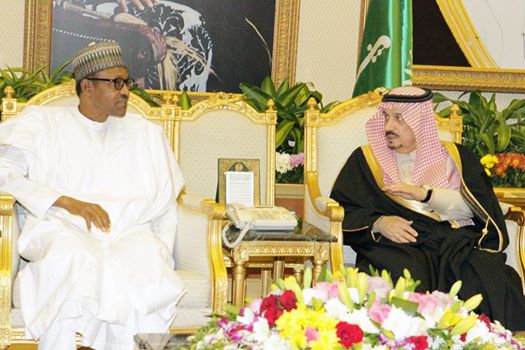
A much trumpeted oil and gas investment plan between Nigeria and Saudi Arabia that would have addressed key challenges in the downstream sector, including establishment of refinery has been left in limbo.
The development, hinged on the inability of the Federal Government to follow up after endorsing a draft pact by the Kingdom of Saudi Arabia, The Guardian learnt yesterday, messed up the opportunity.
The expectations were that if the deal became feasible, Nigeria could address oil and gas infrastructure shortfall hovering around N18 trillion and stabilise economic development, particularly by blocking leakages, addressing pipeline infrastructure and vandalism challenges as well as spurring industrial activities through gas sector development.
When The Guardian contacted the Presidency, Senior Special Assistant, Media and Publicity to the President Muhammadu Buhari, Garba Shehu simply redirected this media house to the Ministry of Foreign Affairs as well as Ministry of Trade and Investment, even though the plan was initiated by the President, who doubles as Minister of Petroleum and spearheads the Ministry of Petroleum Resources.
Recall that following an earlier visit of the Minister of Energy Industry and Mineral Resources of the Kingdom of Saudi Arabia, Khalid Al Falih to Nigeria, as well as a relationship established between President Buhari, the King of Saudi Arabia, Salman bin Abdulaziz Al Saud, and the Crown Prince, Mohammed bin Salman bin Abdulaziz Al Saud earlier in 2015, Buhari had directed the former Minister of State for Petroleum Resources, Dr. Emmanuel Ibe Kachikwu to leverage the existing relationship to attract investments from Saudi Arabia to Nigeria.
The delegation, which included top executives from key parastatals in the Ministry of Petroleum Resources was mandated to explore areas of cooperation and collaboration in the oil and gas industry between both countries, especially in the downstream sector; refineries and petrochemicals; gas and mid-stream infrastructure, knowledge-sharing, command and control, as well as stabilisation of the global oil market.
The Guardian had contacted Garba Deen Muhammad, who is the Special Adviser on Media to the Minister of State for Petroleum Resources, Timipre Sylva but he disclosed that he has no detail on the move, adding that information would be provided should there be any development on the investment drive.
Al Falih had expressed his country’s readiness to sign a Memorandum of Understanding (MoU) with Nigeria, while the draft of the MoU was expected to be ready in the first week of May, 2019, as the then Organisation of Oil Exporting Countries (OPEC) governors for Saudi Arabia and Nigeria, Adeeb Al-Aama and Dr. Omar Farouk respectively were at that time nominated to fast-track the process for official endorsements and signing.
While the MoU was drafted by Nigeria and endorsed by royal council of the Kingdom, the discussion did not advance because of the last general elections and cabinet changes.
A source familiar with the pact told The Guardian that though millions of naira was spent to finance the all-expense paid trip for delegates that visited Saudi Arabia over the investment push, Nigeria lost its reputation by failing to advance the deal.
“The MoU was drafted. The Saudis made minor changes and waited for Nigeria to set up time for the signing of the MoU. But there was delay afterwards due to political activities. After the new administration came, we expected that discussion to come up since the Saudis were waiting but nothing has been done since then, the source said.
Though Buhari visited Saudi Arabia after the discussion as most stakeholders expected the President to raise the discussion, the source told The Guardian, the President equally failed to promote the discussion.
While canvassing for the plan at a time Nigeria was struggling to attract investors due to uncertainties in the oil and gas sector and harsh operating environment, former Minister of State for Petroleum Resources, Ibe Kachikwu had told The Guardian that, “We want to leverage the huge successes of the Saudi government in terms of petroleum. Last year alone, Saudi’s Aramco, the equivalent of our NNPC made about $200b. We have a lot of common ground, historical ties, and religious ties and there’s a need to move further. We cooperate a lot with one another in OPEC, especially in the Ministry of Energy.”
Coming at a time when Nigeria’s oil and gas sector is facing a dismal future as projects worth over $163 billion remain in limbo amid worsening investment drought, drop in oil revenue and other challenges, some stakeholders, especially the former President of Nigerian Association for Energy Economists (NAEE), Prof. Wumi Iledare noted that the development lays bare the lack of continuity in government and neglect for critical business decisions.
Iledare, who had said the country would have benefited more from such deal, stated that the current reality further shows the need for the Federal Government to pass the Petroleum Industry Bill.
Apart from a series of engagements with key government personalities in Saudi, Nigeria’s team to Saudi Arabia had met with top executives of Aramco, King Abdullah Petroleum Studies and Research Center (KAPSARC), Saudi Basic Industries Corporation (SABIC), and Royal Commission for Jubail and Yanbu (RCJY) to explore possible solutions and business opportunities that would help the country to grow its petroleum sector.
